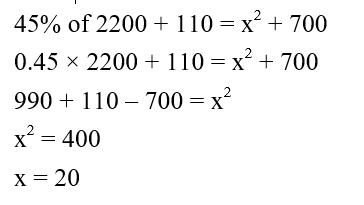Question 1:
‘A’, ‘B’ and ‘C’ started a business such that the sum invested by ‘A’ is 1/3rd of total sum invested and 2/3rd of the sum invested by ‘B’. If ‘A’, ‘B’ and ‘C’ invested their sums for 8 months, 6 months and 4 months, respectively, then find the ratio of profits received by ‘A’, ‘B’ and ‘C’
‘A’, ‘B’ और ‘C’ ने एक व्यवसाय इस प्रकार शुरू किया कि 'A' द्वारा निवेश की गयी राशि कुल निवेशित राशि का 1/3 है और 'B' द्वारा निवेश की गयी राशि का 2/3 है। यदि ‘A’, ‘B’ और ‘C’ ने क्रमशः 8 महीने, 6 महीने और 4 महीने के लिए अपनी राशि का निवेश किया, तो ‘A’, ‘B’ और ‘C’ द्वारा अर्जित लाभ का अनुपात ज्ञात कीजिए।
Question 2:
4 years ago from now, Ram said to Kanha, I am twice older to you. 12 years hence from now, Kanha said to ram, I am 30% younger to you. Find the present age of Kanha.
आज से 4 वर्ष पहले राम ने कान्हा से कहा, मैं तुमसे दुगना बड़ा हूं। अब से 12 बाद बाद कान्हा ने राम से कहा, मैं तुमसे 30% छोटा हूं। कान्हा की वर्तमान आयु ज्ञात कीजिए।
Question 3:
‘A’ and ‘B’ entered into a business with an initial investment of ₹1200 and ₹1600, respectively. After 5 months, ‘A’ added ₹800 more while ‘B’ withdrew ₹600. If total profit earned by both of them together after a year is ₹13300 then find profit share of ‘A’.
‘A’ और ‘B’ ने क्रमशः ₹1200 और ₹1600 के शुरुआती निवेश के साथ एक व्यवसाय में प्रवेश किया।5 महीने के बाद, 'A' ने ₹800 अधिक जोड़ें जबकि 'B' ने ₹600 निकाल लिए। यदि एक वर्ष के बाद दोनों द्वारा अर्जित कुल लाभ ₹13300 है तो 'A' का लाभ हिस्सा ज्ञात करें।
Question 4:
150 litres of mixture ‘A’ contains 40% oil and rest water. 120 litres of mixture ‘B’ which contains 25% water and rest oil, is added to mixture ‘A’. Find the ratio of oil to water in the resultant mixture.
150 लीटर मिश्रण 'A' में 40% तेल और शेष पानी है।120 लीटर मिश्रण 'B', जिसमें 25% पानी और शेष तेल है, को मिश्रण 'A' में मिलाया जाता है। परिणामी मिश्रण में तेल और पानी का अनुपात ज्ञात कीजिए।
Question 5:
₹‘x’ amounts to ₹8450 when invested at 20% p.a. simple interest for 8 years. Find the interest received when the same sum is invested for 4 years at 15% p.a. simple interest.
रु. ‘x’ सयंचित होकर रु. 8450 हो जाती है जब इसे 8 वर्ष के लिए 20% प्रति वर्ष साधारण ब्याज की दर से निवेश किया जाता है।उसी राशि को 4 वर्षों के लिए 15% प्रति वर्ष साधारण ब्याज की दर से निवेश करने पर प्राप्त ब्याज ज्ञात कीजिए।
Question 6:
Harsh when works with 25% increased efficiency, can complete a work in 12 days. Raj takes 10 days more than time taken by Harsh with original efficiency. Find time taken by Harsh and Raj together to complete 64% of work with their original efficiencies.
हर्ष, जब 25% बढ़ी हुई दक्षता के साथ काम करता है, तो वह एक काम को 12 दिनों में पूरा कर सकता है।कार्य को समाप्त करने के लिए राज द्वारा लिया गया समय, वास्तविक दक्षता के साथ हर्ष द्वारा लिए गये समय से 10 दिन अधिक है। वास्तविक दक्षता के साथ हर्ष और राज द्वारा साथ में 64% काम करने में लिया गया समय ज्ञात कीजिए।
Question 7:
Rakesh goes to school with a speed of 8 km/hr and returns with a speed of 6 km/hr. If the total time taken by Rakesh in the journey from home to school and back is 14 hours, then find the distance between school and home of Rakesh.
राकेश 8 किमी/घंटा की गति से स्कूल जाता है और 6 किमी/घंटा की गति से लौटता है। यदि राकेश द्वारा घर से स्कूल और वापस आने में लिया गया कुल समय 14 घंटे है, तो राकेश के स्कूल और घर के बीच की दूरी ज्ञात कीजिए।
Question 8:
The ratio of speed of a boat in still water and the speed of the current is 7:5, respectively. If the speed of the boat in still water had been twice, then it would have travelled 228 km downstream in 4 hours. Find upstream speed of boat.
शांत जल में एक नाव की गति और धारा की गति का अनुपात क्रमशः 7:5 है। यदि शांत जल में नाव की गति दुगनी होती, तो वह धारा अनुप्रवाह में 228 किमी की दूरी को तय करने में 4 घंटे लगते। नाव की धारा विरुद्ध गति ज्ञात कीजिए।
Question 9:
When 45% of 2200 is added to 110 the resultant is 700 more than square of ‘x’. Find the value of ‘x’.
जब 2200 के 45% को 110 में जोड़ा जाता है तो परिणामी 'x' के वर्ग से 700 अधिक है। ‘x’ का मान ज्ञात करें?
Question 10:
The average of present ages of Karan, Vijay and Rakesh is 46 years. 3 years hence from now, ratio of the ages of Karan, Vijay and Rakesh will be 7: 5: 9 respectively. What was the age of Rakesh 3 years ago from now?
करन, विजय और राकेश की वर्तमान आयु का औसत 46 वर्ष है। अब से तीन वर्ष बाद, करन, विजय और राकेश की आयु का अनुपात क्रमशः 7:5:9 होगा। आज से तीन वर्ष पहले राकेश की आयु कितनी थी?

